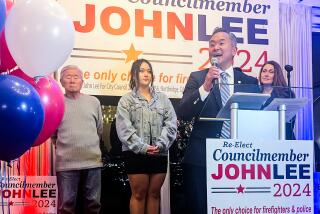Topics / POLITICS : Development Issues Dominate Malibu City Council Race
- Share via
The six candidates running for two seats on the Malibu City Council agree development must be closely controlled. But several of them are split on how to do so.
No issue draws the interest and ire of Malibu residents as development and how to restrain it. It was dissatisfaction with Los Angeles County’s land-use decisions and bureaucracy that fueled the city’s incorporation drive in 1991.
For the record:
12:00 a.m. March 20, 1994 For the Record
Los Angeles Times Sunday March 20, 1994 Home Edition Westside Part J Page 3 Zones Desk 1 inches; 29 words Type of Material: Correction
Malibu candidate--Tom Hasse, who is seeking a Malibu City Council seat in the April 12 election, is a USC graduate student studying communications. His occupation was incorrectly listed in a March 17 story.
Now, in the third election since incorporation, the candidates have focused on the latest development concern: how to protect the town’s rural beauty without infringing on the rights of single-family homeowners to improve their property.
Running in the April 12 election are incumbents Walt Keller and John Harlow; Tom Hasse, 33, a city of Los Angeles management analyst; Jeff Jennings, 50, an attorney; Louis Ragsdale, 72, a semi-retired real estate agent, and Robert Stratman, 71, a retired educator.
Harlow, Jennings and Ragsdale said a draft of the General Plan, which will guide Malibu’s growth, places too many restrictions on homeowners who want to develop their land. Hasse and Keller, meanwhile, said such controls are needed to preserve the town’s rustic flavor. Stratman declined to speak in detail on the subject, preferring to focus on improving the city’s tax base and what he believes is a dearth of leadership on the council.
Harlow, a retired division manager of Hughes Aircraft Co., was appointed in 1992 to fill the unexpired term of then-mayor Larry Wan, who resigned. Often the dissenting voice on the five-member council, he has called the draft General Plan “the silent killer of the homeowner.”
“I don’t see why we need all these regulations for every facet of what a homeowner wants to do to their property,” he said. “Are all these rules really enhancing the value of their property?”
Specifically, Harlow objects to the plan’s proposal to create seven environmental and conservation review departments, any of which could oversee proposals for single-family construction and remodeling.
“We became a city to get away from county bureaucracy, and the council is replacing it with their own,” said Harlow, 63.
The plan, Harlow said, will be more restrictive than the interim zoning ordinance, a stopgap law the city passed last March that will be in effect until it adopts a General Plan, due by November under state law.
Among other things, the ordinance restricts the height of houses to 18 feet and limits their size to 5,000 square feet on a half-acre lot and 7,000 square feet on an acre lot. To exceed those standards, a homeowner must obtain council approval.
Harlow said he would seek to ensure such tight provisions not be incorporated into the General Plan.
Jennings called the draft General Plan “undemocratic” and “a broad scatter gun that hits everybody.”
Ragsdale, a real estate agent, said the only thing left out of the draft General Plan was the “birthing process of a human being.” He said the plan will choke the community with regulations “that are devaluing property and businesses, many of which have failed in Malibu.”
But supporters of the draft see it as a key step toward open space preservation.
Hasse, 33, disputes that the plan is too restrictive.
Hasse, endorsed by Mayor Carolyn Van Horn and Mayor Pro Tem Jeff Kramer, also has suggested a bond issue to raise money to purchase private property that would be maintained as parkland.
Keller, who is seeking another four-year term, finds nothing burdensome about the zoning ordinance or the draft General Plan. A retired aerospace engineer who has been on the council since cityhood, Keller has epitomized the community’s spirit of protectionism. He has been an architect of the city’s slow-growth dictum that is expected to be formalized in the General Plan.
“We’re not doing anything that general plans in Carmel, Saratoga and Lafayette haven’t done,” Keller said.
“I think private property rights go both ways,” Keller said. “We’re looking for a win-win situation. I take my orders from the community.”
Stratman, 72, said he has not read all of the General Plan draft and declined to discuss the interim zoning ordinance.
He said he would improve leadership on the council and shore up the city’s tax base, which he contends could benefit from development of a controversial parcel in the heart of the city. He suggested luring a think tank to the property, where developers unsuccessfully sought to build an 815-unit mixed-use project.
More to Read
Sign up for Essential California
The most important California stories and recommendations in your inbox every morning.
You may occasionally receive promotional content from the Los Angeles Times.













